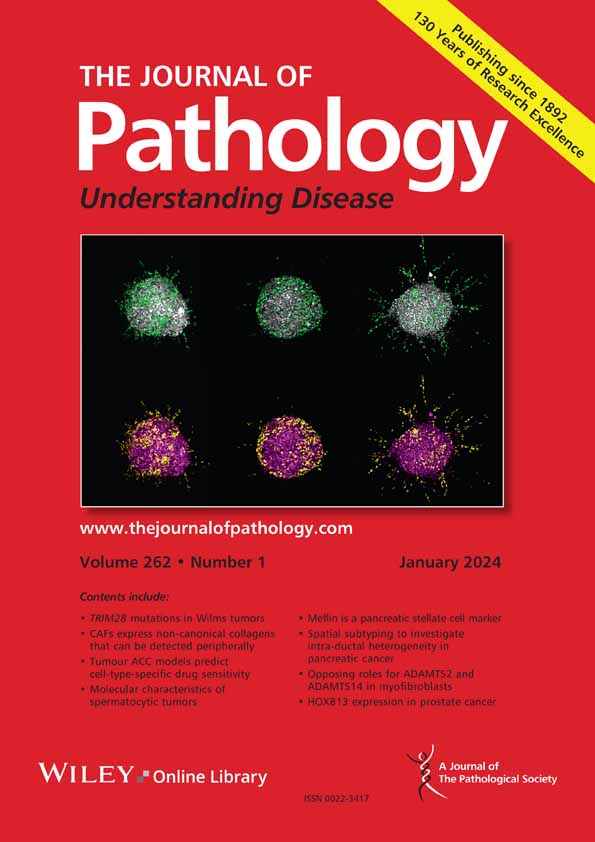Ge Huang, Luke Ternes, Christian Lanciault, Kevin MacPherson-Hawthorne, Young Hwan Chang, Rosalie C Sears, John L Muschler
求助PDF
{"title":"Suppression of dystroglycan function accompanies pancreatic acinar-to-ductal metaplasia and favours dysplasia development","authors":"Ge Huang, Luke Ternes, Christian Lanciault, Kevin MacPherson-Hawthorne, Young Hwan Chang, Rosalie C Sears, John L Muschler","doi":"10.1002/path.6356","DOIUrl":null,"url":null,"abstract":"<p>The basement membrane (BM) is among the predominant microenvironmental factors of normal epithelia and of precancerous epithelial lesions. Evidence suggests that the BM functions not only as a barrier to tumour invasion but also as an active tumour-suppressing signalling substrate during premalignancy. However, the molecular foundations of such mechanisms have not been elucidated. Here we explore potential tumour-suppressing functions of the BM during precancer evolution, focusing on the expression and function of the extracellular matrix receptor dystroglycan in the pancreas and pancreatic disease. We show that the dystroglycan protein is highly expressed in the acinar compartment of the normal pancreas but lower in the ductal compartment. Moreover, there is a strong suppression of dystroglycan protein expression with acinar-to-ductal metaplasia in chronic pancreatitis and in all stages of pancreatic precancer and cancer evolution, from acinar-to-ductal metaplasia to dysplasia to adenocarcinoma. The conditional knockout of dystroglycan in the murine pancreas produced little evidence of developmental or functional deficiency. However, conditional deletion of dystroglycan expression in the context of oncogenic <i>Kras</i> expression led to a clear acceleration of pancreatic disease evolution, including accelerated dysplasia development and decreased survival. These data establish dystroglycan as a suppressor of pancreatic dysplasia development and one that is muted in chronic pancreatitis and at the earliest stages of oncogene-induced transformation. We conclude that dystroglycan is an important mediator of the tumour-suppressing functions of the BM during precancer evolution and that reduced dystroglycan function increases cancer risk, highlighting the dynamics of cell–BM interactions as important determinants of early cancer progression. © 2024 The Pathological Society of Great Britain and Ireland.</p>","PeriodicalId":232,"journal":{"name":"The Journal of Pathology","volume":"264 4","pages":"411-422"},"PeriodicalIF":5.6000,"publicationDate":"2024-10-22","publicationTypes":"Journal Article","fieldsOfStudy":null,"isOpenAccess":false,"openAccessPdf":"","citationCount":"0","resultStr":null,"platform":"Semanticscholar","paperid":null,"PeriodicalName":"The Journal of Pathology","FirstCategoryId":"3","ListUrlMain":"https://onlinelibrary.wiley.com/doi/10.1002/path.6356","RegionNum":2,"RegionCategory":"医学","ArticlePicture":[],"TitleCN":null,"AbstractTextCN":null,"PMCID":null,"EPubDate":"","PubModel":"","JCR":"Q1","JCRName":"ONCOLOGY","Score":null,"Total":0}
引用次数: 0
引用
批量引用
Abstract
The basement membrane (BM) is among the predominant microenvironmental factors of normal epithelia and of precancerous epithelial lesions. Evidence suggests that the BM functions not only as a barrier to tumour invasion but also as an active tumour-suppressing signalling substrate during premalignancy. However, the molecular foundations of such mechanisms have not been elucidated. Here we explore potential tumour-suppressing functions of the BM during precancer evolution, focusing on the expression and function of the extracellular matrix receptor dystroglycan in the pancreas and pancreatic disease. We show that the dystroglycan protein is highly expressed in the acinar compartment of the normal pancreas but lower in the ductal compartment. Moreover, there is a strong suppression of dystroglycan protein expression with acinar-to-ductal metaplasia in chronic pancreatitis and in all stages of pancreatic precancer and cancer evolution, from acinar-to-ductal metaplasia to dysplasia to adenocarcinoma. The conditional knockout of dystroglycan in the murine pancreas produced little evidence of developmental or functional deficiency. However, conditional deletion of dystroglycan expression in the context of oncogenic Kras expression led to a clear acceleration of pancreatic disease evolution, including accelerated dysplasia development and decreased survival. These data establish dystroglycan as a suppressor of pancreatic dysplasia development and one that is muted in chronic pancreatitis and at the earliest stages of oncogene-induced transformation. We conclude that dystroglycan is an important mediator of the tumour-suppressing functions of the BM during precancer evolution and that reduced dystroglycan function increases cancer risk, highlighting the dynamics of cell–BM interactions as important determinants of early cancer progression. © 2024 The Pathological Society of Great Britain and Ireland.
dystroglycan 功能的抑制伴随着胰腺尖状体到胰腺导管的转变,并有利于发育不良的发展。
基底膜(BM)是正常上皮和癌前上皮病变的主要微环境因素之一。有证据表明,基底膜不仅是肿瘤侵袭的屏障,还是癌前病变期间抑制肿瘤的活跃信号基质。然而,这种机制的分子基础尚未阐明。在此,我们探讨了细胞外基质受体 dystroglycan 在胰腺和胰腺疾病中的表达和功能,从而探索了细胞外基质在癌前病变过程中的潜在肿瘤抑制功能。我们发现,dystroglycan 蛋白在正常胰腺的针叶区表达较高,但在导管区表达较低。此外,在慢性胰腺炎中,以及在胰腺癌前病变和癌症演变的各个阶段(从针尖到导管变性、发育不良到腺癌),dystroglycan 蛋白的表达都会随着针尖到导管变性而受到强烈抑制。在小鼠胰腺中条件性敲除 dystroglycan 几乎不会产生发育或功能缺陷的证据。然而,在致癌 Kras 表达的情况下,有条件地删除 dystroglycan 的表达会明显加速胰腺疾病的演变,包括加速发育不良的发展和降低存活率。这些数据证实,dystroglycan 是胰腺发育不良发展的抑制因子,在慢性胰腺炎和癌基因诱导转化的最早阶段,dystroglycan 的表达被抑制。我们的结论是,在癌前病变演化过程中,肌壁蛋白是肿瘤抑制功能的重要介质,而肌壁蛋白功能减弱会增加患癌风险,这凸显了细胞与肌壁蛋白相互作用的动态变化是早期癌症进展的重要决定因素。© 2024 大不列颠及爱尔兰病理学会。
本文章由计算机程序翻译,如有差异,请以英文原文为准。

 求助内容:
求助内容: 应助结果提醒方式:
应助结果提醒方式:


